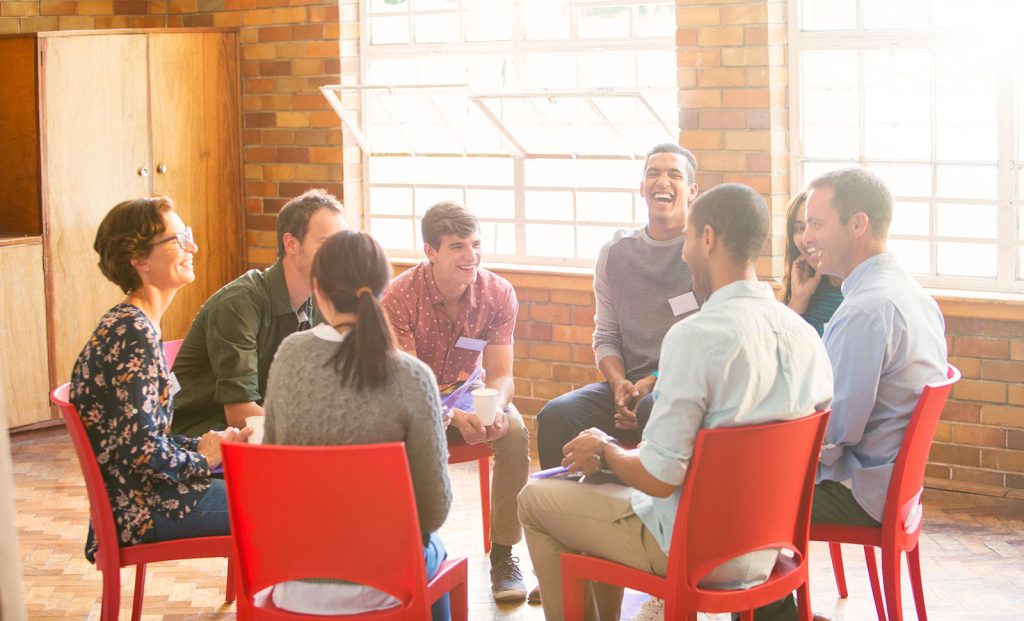Addiction is the inability to have control over doing, using, or taking something until you reach a point where it can be harmful to you and others.
It’s often associated with things like alcohol, drug use, smoking, and gambling, which are very common among young and young adults, according to the Substance Abuse and Mental Health Services Administration (SAMHSA) studies. Although, addiction can refer to just about anything, including work, shopping, the internet, and many more.
Even though addiction is a common problem, the good news is that help is readily available.
In this article, we’ll talk about the importance of treatment options. We’ll also talk about how they manage addiction and its symptoms to find a long-lasting addiction recovery transitional plan and patient stabilization healthcare.
Let’s get started.

Table of Contents
Understanding Addiction
Below are various elements of addiction, its impact on family and friends, and some common symptoms.
The Biological and Psychological Aspects of Addiction
Addiction can happen because of several reasons. The primary reason is that the substance you’re addicted to affects certain chemicals in the brain. These chemicals control the pleasure center, which is why you feel such a strong sense of pleasure each time you do, use, or take a certain substance. Not only do you feel good, but you also get this overwhelming urge to use it again and again.
Two of the most common of these chemicals are dopamine and serotonin neurotransmitters.
Research shows that addictive substances, especially narcotic drugs, flood the brain with these neurotransmitters, which encourage repeated use, inhibition, and impulsive behavior.
For example, it can result in a mental ‘high’ after each win. Even the pursuit of a game can be addictive because it gets you hyped up in anticipation of a win.
The problem starts when coming down off that high causes withdrawal symptoms, which can be unpleasant. So, it becomes easier to carry on doing or having the thing you crave.
Pretty soon, you start needing more and more to satisfy your cravings. That’s when the addiction spirals out of control.
Impact of Addiction on Family and Friends
People who suffer from addiction soon become withdrawn from family and friends. They start hanging around people who have a substance abuse disorder.
At home, addiction can cause irreparable harm to relationships and drive rifts between family members.
Also, if there are children living in a home environment where there’s any type of substance abuse, it can increase the risk of them developing potential drug problems in the future.
Recognizing the Signs of Addiction
Understanding the signs of addiction is critical because it’s the first step to seeking help for yourself or someone you care about. Here’s a brief list of the most common psychological, behavioral, and physical signs of addiction.
Psychological Signs
- Inattentiveness
- Anxiousness
- Sudden mood swings
- Lack of motivation
- Unexplained paranoia
Behavioral Signs
- Disregard of the damage caused by the substance being abused
- Obsessive thoughts and actions
- Loss of control
- Hiding the addiction
- Denial of being addicted or misusing any substance
Physical Signs
- Sudden weight loss or gain
- Insomnia
- Poor physical coordination
- Enlarged or small pupils
- Looking unkempt

Overview of Garden State Treatment Center
Luckily, addiction in all its forms is treatable. One way to seek help is at Garden State Treatment Center, which is a modern treatment facility located at 350 Sparta, New Jersey.
Tucked away in a peaceful countryside setting, it offers partial care and outpatient treatment services for all types of substance abuse and substance use disorders. In this clean and tranquil environment, clients have a safe space where they can calibrate and reflect.
The center aims to help clients rebuild their lives so that they can ease back into society. While it’s primarily an outpatient facility, it also offers short-term accommodation for partial hospitalization.
Garden State Treatment Center: A List Of Treatment Programs
Over the years, Garden State Treatment has helped thousands of clients get over their addictions thanks to the wide range of programs offered at Garden State Treatment Center.
Some of these include intensive outpatient care, partial care, and dual diagnosis treatment. For each program, it bases its treatment on two strategies: 12-step philosophy and evidence-based therapy.
Every human services program is carried out by experienced accredited health professionals or clinicians who will guide you through every step of the recovery process.
The best thing about Garden State Treatment is that they don’t just treat the individual, they treat the entire family.
Each client receives personalized care, including individual and group therapy, family counseling, relapse prevention, adventure therapy, and more.
Their solution-focused techniques and evidence-based treatment approach are what make this facility one of the best in the country.
Partial Care Program
A partial care program is an intensive and comprehensive treatment process that offers a home-like environment that allows you to feel as relaxed and comfortable as possible on your road to sobriety. This part of the process is non-residential and gives clients more freedom than residential programs.
Through psychiatric care in coordination with group support and therapy, clients are encouraged to focus on the underlying circumstances that may have contributed to their addiction. They’re also provided with the coping mechanisms they need to integrate back into society.
Intensive Outpatient Program
As the name suggests, through this part of the recovery process, clients are given a personalized plan that includes attending individual and group therapy sessions multiple days a week. There are also in-depth educational sessions that focus mainly on emotional sobriety and relapse prevention.
Through intensive outpatient programs (IOP), you can expect a higher level of care compared to regular outpatient programs. You can also benefit from a more comprehensive treatment plan based on your individual needs for as long as you need until you’ve fully recovered. Yet, on average IOPs usually last between 3–6 months.
There’s also an evening intensive outpatient program for those who would rather attend therapy sessions after they get off work or after their children go to bed.
Outpatient Program
Outpatient programs allow clients to pursue their treatment and recovery while going about their normal routine. It’s ideal for those who don’t experience severe withdrawal symptoms or have recently relapsed.
Through this program, you can talk to a therapist or join in a group therapy session. It also allows you to connect with a sponsor whom you can talk to outside of these sessions.
Aftercare and Alumni Program
The Alumni program brings those just starting out on the path to recovery with those who are further along. Bringing together recovering addicts who continue to stay clean and sober helps them thrive. They’re surrounded by empathy, friendship, and a strong support system, and the aftercare program encourages them to remain in touch with these connections.
Having someone who understands what you’re going through has been linked to a strong recovery. It also helps recovering addicts realize their self-worth and purpose and encourages them to utilize the skills they learned during treatment, which support their recovery.

Therapeutic Approaches Utilized at Garden State Treatment Center
Below is a quick overview of some of the therapeutic approaches applied at Garden State Treatment for mental health treatment, substance abuse treatment, or drug abuse disorder treatment.
Cognitive Behavioral Therapy
Cognitive behavioral therapy (CBT) is based on talk therapy sessions. As a form of short-term psychotherapy, this type of behavioral health therapy combines cognitive and behavioral theories.
It aims at transforming negative thoughts and thinking patterns into more positive, goal-oriented ones. Hence, it works to enhance mental health and foster positive development.
Dialectical Behavioral Therapy
Dialectical behavioral therapy (DBT) was originally founded to treat people with borderline personality disorders and those with suicidal behaviors.
DBT is based on four core beliefs:
- Mindfulness: brings awareness of the present and how to live each moment to the fullest
- Distress tolerance: teaches coping skills to deal with distressing situations
- Emotion regulation: highlights various emotions, the reasons behind them, and how to manage them
- Interpersonal effectiveness: builds healthy relationships based on open communication, respect, trust, and honesty
Motivational Interviewing
Motivational interviewing (MI) works to encourage clients to change their thought processes and, ultimately, their behavior. Through this program, they explore and come face to face with the reasons for their addiction.
This aims to get clients to consider making changes for the better and steer clear of their addiction.
Family Therapy
People often think that addiction only impacts the one who’s suffering. However, any type of substance abuse can bring about negative reverberations on loved ones.
As such, family therapy has been a highly popular counseling program at Garden State Treatment.
Carried out by a licensed therapist, these sessions are designed to improve the mental state of the whole family. It also works to improve communication between family members while allowing them to understand why the addiction happened in the first place.
Another vital part of this method of therapy is that it provides everyone in the family with a better understanding of the triggers that can push someone to start using or doing again. It also highlights which enabling behaviors to avoid to help facilitate recovery.
Group Therapy and Peer Support
As we mentioned above, one of the most successful ways to recover from addiction is to express your thoughts and emotions among support groups of recovering addicts.
At Garden State Treatment, you’ll get to join support services in both small and large groups. While the former offers more time dedicated to each member of the recovery support group, the latter provides a better group dynamic and more diversity.
Conclusion
Garden State Treatment Center offers a wide range of addiction treatment programs. Together, they offer clients a multifaceted approach to determining the unlying causes of addiction, which starts with a comprehensive assessment followed by a personalized plan that addresses the unique needs of each client.
The center offers access to live chat as well as a direct helpline. Both are confidential and both are available 24/7.
References:
Cited Sources:
- https://www.gardenstatetreatmentcenter.com/
- https://luxuryrehabs.com/garden-state-treatment-center/
- https://my.clevelandclinic.org/health/articles/22581-dopamine
- https://www.medicalnewstoday.com/articles/232248
- https://americanaddictioncenters.org/withdrawal-timelines-treatments
- https://www.ncbi.nlm.nih.gov/pmc/articles/PMC7186308/
- https://store.samhsa.gov/sites/default/files/SAMHSA_Digital_Download/pep20-02-01-020.pdf
Suggested resources for further understanding addiction and recovery:
- https://www.helpguide.org/harvard/how-addiction-hijacks-the-brain.htm
- https://www.hazeldenbettyford.org/addiction/what-is-addiction
- https://www.smartrecovery.org/smart-articles-draft/the-stages-of-change/
- https://www.healthpartners.com/blog/how-to-support-someone-through-substance-use-recovery/
- https://www.cdc.gov/drugoverdose/featured-topics/recovery-SUD.html



